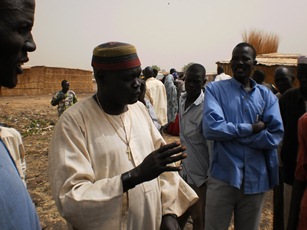Over 100 returnees stranded at Bentiu port, Unity state
By Bonifacio Taban Kuich
May 22, 2012 (BENTIU) – More than 132 returnees have been stranded at Bentiu port for two months waiting for the South Sudan government to give them land for resettlement.

George Puok Dhiel, a returnee who has spent two months at Bentiu port, blames the state government for failing to respond to their needs. He is deeply concerned about the approaching rainy season as they are living near the river bank and the water-level is liable to rise.
He told Sudan Tribune on Tuesday that they have expressed their concerns to state government, to no avail.
“We are approaching the rainy season, we have no food, what are we going to do? Our children are suffering from malaria because of rainfall. We have no hospital to take them for treatment […] we are looking forward for the government to take quick steps to rescue our lives by providing us with plastic sheets and land allocation before the rains worsen,” said Dhiel.
Many of the returnees have insufficient food supplies as they were unable to cultivate land in 2011.
On 15 March William Kuol Geng, state director of SSRRC, confirmed around 130 of the 1,000 returnees were left at the port due to insecurity and land mines in Mayom and Abiemnom counties of Unity State.
He added that the state government is working hard to process land for the returnees in the state capital. Geng added that it is a time-consuming process, but the returnees needs will be met soon.
He explained that the ministry of physical infrastructure are ready to start work with the returnees, but are waiting for a list of those eligible for assistance and who is travelling where.
Geng dismissed the claims that the returnees do not have sufficient food supplies, saying that aid agencies have provided them with enough to eat for three months.
(ST)
